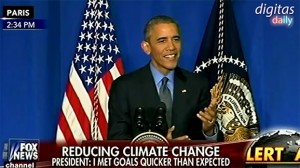President Obama and a contingent of nearly 500 Americans returned last week from the much-anticipated climate conference in Paris, armed with a historic new international agreement – finally – to address what the President has called the most urgent threat to our national security, and our planet. What a fitting message to the terrorist thugs who attacked Paris just weeks earlier, he said.
These global warming conferences have been held by the UN for 21 years. But this is the first time 195 countries finally agreed to specific targets for reducing greenhouse gas emissions, and to create a green third-world economic development fund into which the wealthiest countries would have to pay to make up for their pollution. Even China had finally come around, signaling that the new policies could finally produce results even in the world’s most rapidly industrializing nations. The White House press office touted it as an accomplishment of millennial importance, and the loyal press corps dutifully reported our President’s persuasive leadership, without which this could not have been achieved.
Well, not exactly. Despite all the joy among liberals and gnashing of teeth among conservatives, the agreement itself is actually something of an anti-climactic nothing burger. My friend Paul Driessen at the Committee for a Constructive Tomorrow wrote a detailed column calling it “voluntary mush.”
Don’t get me wrong; I was as nervous as anyone about what our leaders might be committing us to. Readers of this column may remember that a month ago I warned in dire terms about a binding agreement in Paris that might “lock in” some of the most damaging proposed EPA regulations: the Waters of the U.S. Rule that would claim federal jurisdiction over all water, the Clean Power Plan to kill the coal industry, and others.
The plan was that by committing the U.S. to international binding agreements, such regulations would become the only way to meet our commitments, and nearly impossible for future Administrations to roll back. With the force of a treaty, such international agreements could supersede laws enacted by Congress, or executive orders of future Presidents. And they would not be subject to Congressional approval.
Constitutional or not, it was actually a fairly clever plan. It’s hard not to admire the tenacity of a President who can figure out ways for his agenda to outlast his tenure. You might say it is evidence that President Obama has “aged” in the job – on the general theory that old age and treachery will beat youth and exuberance every time.
However, something went wrong on the way to such long-lasting greatness. Something I did not see coming, and clearly the President did not see coming – the utter inability of the West’s top leaders to convince the other countries to agree to such a thing. In the end, negotiators putting the finishing touches on the agreement had to remove from it nearly everything that remotely resembled “binding,” replaced with a series of voluntary agreements that leave the status quo mostly intact.
Even countries in Western Europe, previously among the world staunchest advocates for such binding agreements, were not willing to bind themselves to emission reduction targets that they have found nearly impossible to meet, at least not without massive and unacceptable damage to their economies. China was not willing to bind itself to any payments at all into the polluter’s fund. Several other vital pieces similarly fell apart.
This is nothing new. It is the same outcome that has prevented meaningful agreements at all of the previous 20 annual climate change conferences. But this time, leaders (including Obama) had raised the expectations to such a high level that they didn’t think they could return home empty handed. So they quietly made the required changes, weakening the document to the point that nearly all present could sign it, and then touted it as one of the great news stories of the century.
When I worked on Capitol Hill years ago, I remember a strategy session held in the late-night hours after a disappointing defeat for my boss on the Senate floor. There was an internal debate about what to tell reporters back home, who were awaiting word of the outcome. Our press secretary, legendary for his crisis-management skill and his sense of humor, solved it by suggesting, “Let’s just declare victory and go home.”
Apparently, that was the UN strategy in Paris last week. Because what they touted as a historic victory was, in fact, a stunning defeat.
(A version of this column originally appeared in the Grand Junction Daily Sentinel December 18, 2015.)




Comments on this entry are closed.